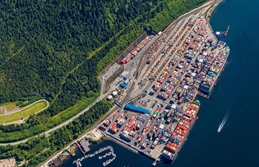
Canadian dock workers' union and their employers have reached a tentative labour deal once again after earlier rejecting a previous agreement.
ILWU Canada announced on July 30 that it agreed on a negotiated deal with its employers — represented by the British Columbia Maritime Employers Association (BCMEA) — averting an immediate strike.
"The ILWU Canada Longshore Bargaining Committee is happy to announce that we have secured a negotiated tentative settlement with the BCMEA," said Rob Ashton, president of the International Longshore and Warehouse Union (ILWU) Canada.
"This will be presented to our members as per our constitution," he added.
The announcement was made just two days after the recommended settlement from federal mediators was rejected by members of ILWU Canada.
The ILWU Canada chief advised union members that voting to ratify the deal will take place on August 3 and 4.
"On Wednesday, August 2, 2023, there will be a Stop Work meeting for the 0800 shift to recommend the Terms of Settlement to the membership," Ashton said in an August 1 statement.
"On Thursday, August 3, and Friday, August 4, 2023, voting will take place to ratify the new collective agreement. Please contact your Local for times and locations to vote," he added separately, noting that the motion would be "that the longshore caucus is recommending to the membership the negotiated terms of the settlement."
Canada stepped in to address the labour disagreement in an attempt to ensure that the ports of Vancouver and Prince Rupert, which are two of Canada's most active ports, remain operational. The strike had caused a disturbance worth over C$6 billion (US$4.6 billion) in trade for almost two weeks.
On July 1, around 7,000 dockworkers who are members of the ILWU Canada went on strike at the West Canada ports of Vancouver and Prince Rupert as the union and the BCMEA were unable to come to an agreement on negotiations.
The strike prevented shipments from entering or leaving 30 ports in British Columbia, including the largest port in Canada, the Port of Vancouver, after failing to reach a new work contract with the BCMEA — which represents the companies involved.



